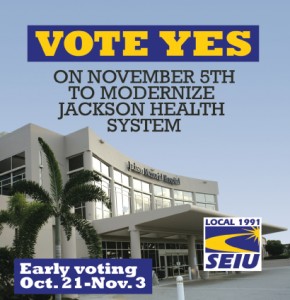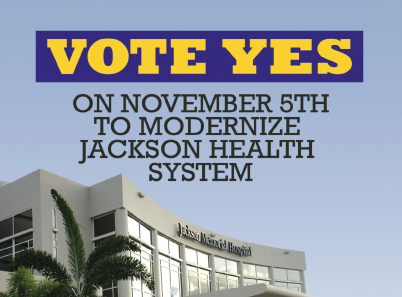After a one-sided, well-funded campaign that went pretty much unchecked and unchallenged by anyone — including yours truly — the $830-million bond referendum (read: public tax) for the modernization of Jackson Memorial Hospital passed overwhelmingly Tuesday.

Some might be surprised that this ballot question passed in an anti-tax community still reeling from the proposal to pay for upgrades to the privately-owned Miami Dolphins stadium that was killed in the legislature earlier this year.
But despite the dozens of consultants on the yes side who will definitely take credit for this win, the one thing that mattered the most was timing. If this referendum had come up next year, during a real election with countywide races and 2014 state seats at stake, some say it may have failed.
You can bet that the proponents counted on the low turnout this year, relying much on the motivated participation of interested parties — like many of the unions who backed the deal — to get out the vote.
Less than 12 percent of the 1.2 million voters came out Tuesday. In other words, 145,135 people participated in this important decision. Fewer still, about 90,000 voters who said yes, are the supposed “mandate” for this tax that affects 100% of property owners.
Because the main election was in Miami, where Jackson was sure to get a lot of support, and there were no real elections outside Miami, Hialeah, Miami Beach and Homestead, it was an easier ballot for the bond. Voters in Aventura, Kendall, West Dade and North Miami or North Miami Beach, for example, may have swayed that margin way the other way.
Add to that the fact that the million dollar yes campaign was unchecked with no organized opposition, and you have an easy coast for the pro side.
After all, who wants to go against doctors and nurses?
“They did it on purpose,” said Miami-Dade Democratic Chair Annette Taddeo. “They gamed the system by doing an election at a time when nobody was going to vote.”
But there are others who say that the timing could have worked against the bond proponents, by going on a ballot that would likely draw an older, more tax-wary, electorate.
“In this election, there was a low turnout with a lot of elderly Cuban-Americans voting, who usually don’t support increases in taxes,” said Florida International Professor Dario Moreno, a known campaign pollster who believes strongly that the measure would have passed easier in 2014.
“The lower turnout potentially could have hurt because the people who vote then are the viejitos,” Moreno told me.
Even Miami-Dade Mayor Carlos Gimenez, who had not come out publicly about the referendum until Ladra asked his position, indicated in a statement sent by his staff on Monday that he had mixed feelings.
“While I am personally in favor of funding the modernization and improvements of facilities to the Jackson Health System, I still have questions on the long-term use of those funds in light of the Affordable Care Act. That said, if the voters approve the funding, I will ensure that we exercise the necessary due-diligence so that the people’s money is well-spent. Supporting our County’s safety-net hospital is important to all of us in our community,” Gimenez said.
Ladra hopes he doesn’t mean another hand-picked, blue-ribboned task force committee board of people with an interest in how that $830 million is spent.

